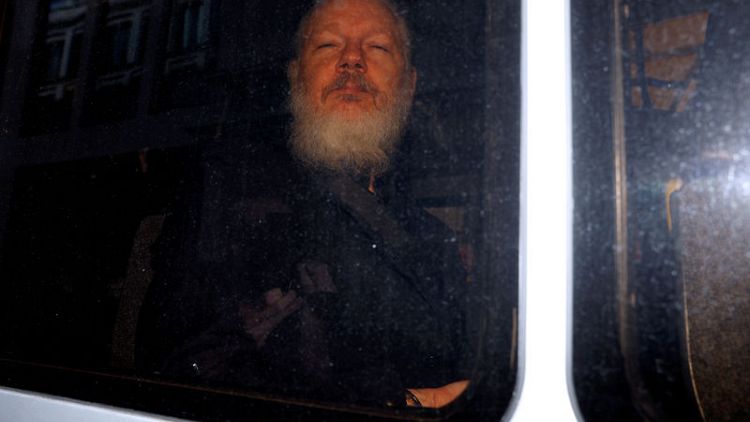By Alistair Smout
LONDON (Reuters) - Julian Assange, wanted by the United States for one of the world's biggest ever security leaks, looked unfazed as he sat in a London court on Thursday, leafing through a book as he waited for proceedings to begin.
Assange studied the pages of "History of The National Security State" by U.S. writer Gore Vidal, angling the book so that reporters in the courtroom and a packed public gallery could see it clearly.
Barely four hours earlier, the WikiLeaks founder had been carried head-first by British police officers out of the Ecuadorean Embassy in London where he had sought refuge nearly seven years earlier.
As Assange sat and read, Judge Michael Snow considered calling security to locate Assange's lawyers, who were late for the start of the hearing.
When he entered the courtroom, the Australian-born activist - wearing a black jacket and black shirt, a hero to some for exposing state secrets, and a villain to others who say he endangers security - gave a thumbs-up to his supporters.
He waved again on his departure.
In the intervening 40 minutes, he heard the confirmation of U.S. charges against him and was found guilty of failing to surrender to a British court in 2012 over Swedish charges of sexual assault.
"NARCISSIST"
A lawyer representing Assange said he pleaded not guilty to failing to surrender over the Swedish charges, arguing it had been reasonable for him to enter the embassy given concerns that the United States could try and have him extradited, and because the original hearings were biased against him.
But Assange declined to give evidence, and Snow found him guilty of breaching his bail.
"His assertion that he has not had a fair hearing is laughable," the judge told Westminster Magistrates' Court.
He said Assange's behaviour was that of "a narcissist who cannot get beyond his own selfish interests" and he had "not come close to establishing reasonable excuse".
Snow said Assange faces up to 12 months in jail when he is sentenced at a later date at Southwark Crown Court.
GET ON WITH YOUR LIFE
The judge also gave the U.S. government a deadline of June 12 to outline its case against Assange.
WikiLeaks incensed Washington by publishing hundreds of thousands of secret U.S. diplomatic cables, and in 2010 a classified U.S. military video showing a helicopter attack in Baghdad in 2007 that killed a dozen people, including two Reuters news staff.
James Hines, a lawyer representing the United States, said the extradition request resulted from a diplomatic note of Dec. 22, 2017, requesting a provisional arrest.
Hines said Assange had resisted police officers when he was arrested on Thursday.
"The officers tried to introduce themselves to him... but he barged past the officers attempting to return to his private room," the lawyer said, adding that Assange had shouted "This is unlawful, I'm not leaving," before he was handcuffed and carried out of the embassy by police officers.
Representing Assange, lawyer Liam Walker said his client had always said there was a U.S. extradition request "waiting in the wings" for him. "His reasons for seeking refuge were well founded," he said.
The judge said Assange could at a later date consent to be extradited to the United States.
The benefit of this, he said with a hint of irony, was that Assange would be able to "get there faster and get on with your life."
(Editing by Mark Heinrich)
